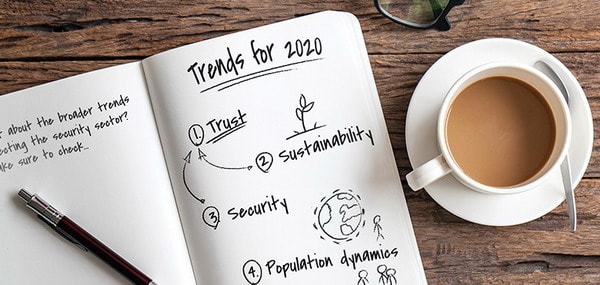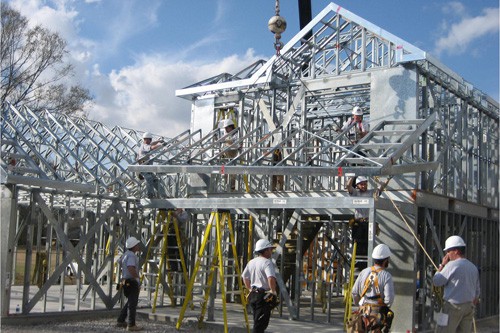
1. Trust: the common link between trends
The concept of trust is a central topic in our contribution to technology trends. From a technological perspective, trust primarily relates to cyber security and privacy. Specifically, whether companies and citizens can trust that products are adequately protected against cyberattacks and that the data collected about them is processed and stored responsibly.
The macro view of trust is much broader. Studies have shown that confidence in business, government, the media and NGOs has waned in recent years. There are many reasons for this – from skepticism about the reliability of online content to concerns about government access to personal data. Consumer uncertainty about the “right” thing of companies and institutions will continue to be a determining trend.
Trust is not only a consumer concern, but also an increasingly important aspect of business-to-business relationships. It is about sustainability commitments, ensuring supplies in a turbulent global environment, a clear ethical position on key issues, and ensuring that an employer recognizes and responds to the concerns of its employees . Business customers will take trust and ethical factors into account when making their purchase decisions.
While we are committed to the saying “ethics begin where the law ends”, it is of course imperative to comply with international and local regulations. The signing of the UN Global Compact is fundamental to any company committed to ethics and should be seen as the basis for further internal initiatives. In addition, compliance with regulations designed to ensure more responsible business conduct – such as the EU’s General Data Protection Regulation – is essential. However, it is likely that legislation will find it difficult to keep up with the acceleration of technological possibilities in the foreseeable future.
2. The need for security
If a trend is constant, it is the need to feel safe. As part of Maslow’s hierarchy of needs , it appears that after basic physiological needs such as air, water, food, shelter, and warmth, human security needs are at the next level. And although the evidence suggests that we are living in a more secure era than ever before, this is not always reflected in people’s perceptions of their personal safety .
Whether it is because the need to feel safe is so fundamental to people and / or that media coverage tends to support a negative view of the world – the individual need to feel safe and secure to feel is always in the foreground of people’s minds.
For those working in the security sector, this need has several critical implications. The most important of these is to find a line between two paradigms that, on the one hand, satisfies the human need for security in public and private spaces without, on the other hand, raising legitimate concerns about an impairment of individual privacy. Here too, an optimal solution will affect both legislation and technological innovations.
3. Sustainability and the environment
It is impossible to write a contribution about global macro trends without mentioning the now recognized and indispensable need for major steps towards sustainability and reducing environmental pollution. The evidence of the negative effects of climate change is overwhelming, and everyone – individuals and companies alike – has to take their own steps in their activities that lead to a remarkable reduction in these harmful environmental influences and contribute to improvement.
As mentioned at the beginning, clear signs of a commitment to more sustainability on the part of a company have become an increasingly important decision factor for customers – at least in certain key markets worldwide. And even in markets that do not require such strict environmental regulations, responsible companies should take every possible step from an ethical perspective.
Of course, technology companies should also reduce the environmental impact of their own business – in terms of building management, transport / logistics and manufacturing – but their technology is also part of the solution. Operated sensors of all types, including surveillance cameras, can help manage resources and energy in urban environments and buildings.
4. Changing population dynamics
The importance of the above trends – especially the need to feel safe and do energy management – will only become more important in relation to another trend: urbanization . More than half of the world’s population already lives in cities , and this number is predicted to increase to more than 60% by 2030. It is assumed that more than 150 new cities with more than 1 million inhabitants will be added worldwide between 2018 and 2030, with an additional 10 new “megacities” (with a population of more than 10 million) being created in the same period.
Therefore, the need to use technology to improve urban environmental management and support the urban population becomes critical. The concept of the “Smart City” developed from this. Here sensors and their collected data are used to make the infrastructure and services of a city better and more efficient for the benefit of its citizens. While smart cities create more efficiency and improvements in many areas – from mobility and transportation to energy consumption, from effective emergency response to early warning of storm disruptions – one of the most important aspects of a city’s quality of life already relates to you trend mentioned: the human need to feel safe.
5. The impact of world politics
It is indeed an attractive idea that every branch of industry, including that of the security sector, can act with relative independence from politics. However, the effects of global macroeconomic influences on certain aspects of economic life have been clearly seen in recent years. Global associations that use the economy and international trade as an instrument – be it through tariffs on certain goods, components and raw materials or through a sales ban for manufacturers in a market in which they were previously active – will probably continue to exist and become one Create a field of uncertainty where you have to be smart. A primary goal for every manufacturer – including Axis – will therefore be to ensure the continued supply of products to our partners and customers.
Ultimately, in the face of these global macro trends, our role is to stay as close as possible to our principles and to align our own economic goals with global initiatives and interests related to sustainability and ethical endeavors. You can read more about how Axis tackles many of these issues in our sustainability report , which we publish year after year.
To stay up to date on the latest security trends and insights from Axis and its partners in the security industry, simply subscribe to the Security Trends & Insights newsletter.




